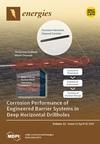Harmonic Sequence Component Model-Based Small-Signal Stability Analysis in Synchronous Machines during Asymmetrical Faults
IF 3
4区 工程技术
Q3 ENERGY & FUELS
引用次数: 0
Abstract
Power systems are complex and often subject to faults, requiring accurate mathematical models for a thorough analysis. Traditional time-domain models are employed to evaluate the dynamic response of power system elements during transmission system faults. However, only the positive sequence components are considered for unbalanced faults, so the small-signal stability analysis is no longer accurate when assuming balanced conditions for asymmetrical faults. The dynamic phasor approach extends traditional models by representing synchronous machines with harmonic sequence components, making it suitable for an unbalanced condition analysis and revealing dynamic couplings not evident in conventional methods. By modeling electrical and mechanical equations with harmonic sequence components, the study implements an eigenvalue sensitivity analysis and participation factor analysis to identify the variable with significant participation in the critical modes and consequently in the dynamic response of synchronous machines during asymmetric faults, thereby control strategies can be proposed to improve system stability. The article validates the dynamic phasor model through simulations of a single-phase short circuit, demonstrating its accuracy and effectiveness in representing the transient and dynamic behavior of synchronous machines, and correctly identifies the harmonic sequence component with significant participation in the critical modes identified by the eigenvalue sensitivity to the rotor angular velocity and rotor angle.非对称故障期间同步电机中基于谐波序列分量模型的小信号稳定性分析
电力系统非常复杂,经常会发生故障,需要精确的数学模型进行全面分析。传统的时域模型用于评估输电系统故障时电力系统元件的动态响应。然而,不平衡故障只考虑正序分量,因此在假设不对称故障的平衡条件下,小信号稳定性分析不再准确。动态相位法扩展了传统模型,用谐波序列分量表示同步电机,使其适用于不平衡状态分析,并揭示了传统方法中不明显的动态耦合。通过对带有谐波序列分量的电气和机械方程建模,该研究实施了特征值灵敏度分析和参与因子分析,以确定在临界模式中具有重要参与度的变量,从而确定同步电机在非对称故障时的动态响应,从而提出控制策略以提高系统稳定性。文章通过模拟单相短路验证了动态相量模型,证明了该模型在表示同步电机的瞬态和动态行为方面的准确性和有效性,并通过对转子角速度和转子角度的特征值灵敏度,正确识别了在临界模式中有重要参与的谐波序列分量。
本文章由计算机程序翻译,如有差异,请以英文原文为准。
求助全文
约1分钟内获得全文
求助全文
来源期刊

Energies
ENERGY & FUELS-
CiteScore
6.20
自引率
21.90%
发文量
8045
审稿时长
1.9 months
期刊介绍:
Energies (ISSN 1996-1073) is an open access journal of related scientific research, technology development and policy and management studies. It publishes reviews, regular research papers, and communications. Our aim is to encourage scientists to publish their experimental and theoretical results in as much detail as possible. There is no restriction on the length of the papers. The full experimental details must be provided so that the results can be reproduced.
 求助内容:
求助内容: 应助结果提醒方式:
应助结果提醒方式:


